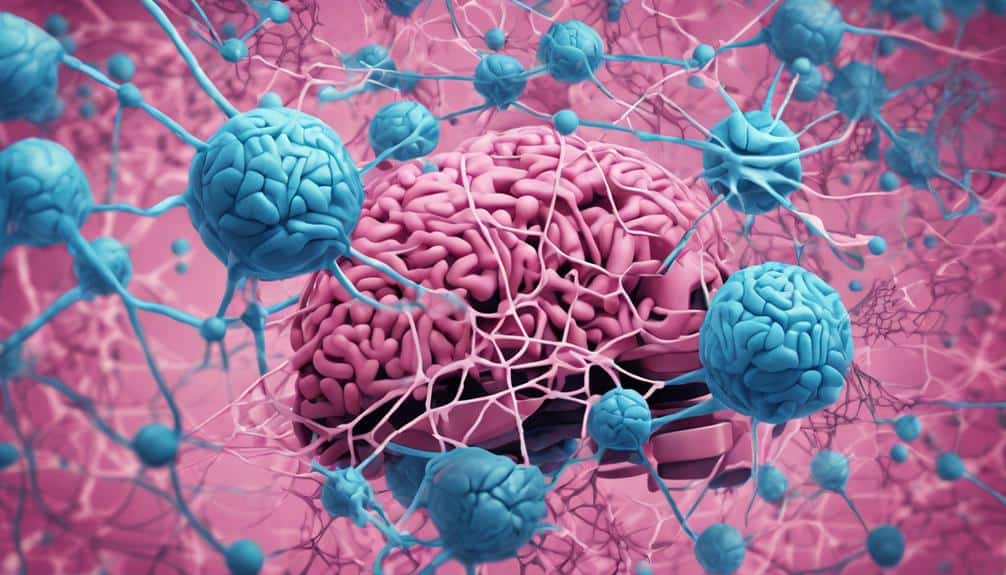Pcos and Adhd
Having PCOS is challenging enough, but what if there's more to the story? It seems that ADHD might be intertwined with PCOS in ways we're just beginning to understand.
The potential implications of this overlap could shed light on new treatment avenues and management strategies for individuals dealing with both conditions.
Key Takeaways
- PCOS is significantly correlated with higher ADHD symptoms in women.
- Elevated prenatal androgen exposure in PCOS may contribute to increased ADHD symptoms.
- Children born to mothers with PCOS have a higher likelihood of developing ADHD.
- Comprehensive management strategies are crucial for improving daily life in individuals with PCOS and high ADHD symptoms.
PCOS and ADHD Connection

Research findings strongly suggest a significant correlation between PCOS and ADHD symptoms in women. Studies have revealed that women with PCOS exhibit higher levels of ADHD symptoms compared to those without the condition. This elevated presence of ADHD symptoms in individuals with PCOS may be linked to increased prenatal androgen exposure, a common characteristic of PCOS.
The role of hormonal factors in the development of ADHD symptoms in women with PCOS is also being investigated. Meta-analyses have shown a 42-43% higher likelihood of ADHD in children born to mothers with PCOS, indicating a potential intergenerational impact. Due to this observed association, screening for ADHD in children of women with PCOS is recommended to facilitate early detection and intervention.
Understanding the connection between PCOS and ADHD in women is important for improving diagnostic accuracy and implementing appropriate treatment strategies for individuals affected by both conditions.
ADHD Symptoms in PCOS

I'll explore how ADHD symptoms manifest in individuals with PCOS, shedding light on the overlapping symptoms and their impact on daily life. Understanding the specific challenges faced by those with both conditions is critical in providing tailored support and interventions.
Identifying these symptoms can lead to improved management strategies for individuals dealing with the complexities of PCOS and ADHD concurrently.
Overlapping Symptoms Explained
The overlapping symptoms of inattention, hyperactivity, and impulsivity observed in women with PCOS suggest a potential link to ADHD. Studies indicate that women with PCOS may experience a higher prevalence of ADHD symptoms compared to those without the condition.
Hormonal imbalances, particularly elevated androgens, in PCOS could play a role in the emergence of ADHD-like symptoms. These shared features can affect emotional well-being and cognitive functions in individuals with PCOS.
Understanding the relationship between PCOS and ADHD symptoms is important for devising effective management strategies. Further research into the mechanisms underlying these overlapping symptoms is necessary to provide thorough care for women with PCOS who also exhibit signs of ADHD.
Impact on Daily Life
Experiencing higher levels of ADHD symptoms, women with PCOS often encounter challenges in daily life and functioning, affecting concentration, organization, and emotional regulation.
- Hormonal imbalances in PCOS may contribute to difficulties in emotional regulation, intensifying mood swings and impulsivity.
- High levels of ADHD symptoms in women with PCOS can lead to increased forgetfulness, making it challenging to manage daily tasks efficiently.
- The impact of hormone balance on ADHD symptoms highlights the intricate relationship between all-encompassing management strategies targeting both conditions to enhance the quality of life and well-being of individuals affected by PCOS and ADHD.
These interactions emphasize the importance of all-encompassing management strategies targeting both conditions to enhance the quality of life and well-being of individuals affected by PCOS and ADHD.
Risk Factors for ADHD in PCOS

I'll address the genetic predisposition for ADHD and the impact of hormonal imbalance in the development of ADHD symptoms in individuals with PCOS.
Genetic factors may contribute to an increased vulnerability to ADHD in women with PCOS, while hormonal disturbances characteristic of PCOS could further exacerbate this risk.
Understanding these risk factors is essential for early identification and tailored management strategies for individuals with PCOS who may also present with ADHD symptoms.
Genetic Predisposition for ADHD
A notable risk factor for Attention Deficit Hyperactivity Disorder (ADHD) in women with Polycystic Ovary Syndrome (PCOS) is the genetic predisposition for ADHD. Understanding the genetic links between these conditions is vital for early detection and intervention. Here are key points to take into account:
- Women with PCOS have a higher likelihood of passing on genetic factors for ADHD to their offspring.
- Shared genetic vulnerabilities between PCOS and ADHD may contribute to the increased risk in offspring.
- Genetic counseling may be beneficial for women with PCOS to address potential ADHD risks in their children.
Hormonal Imbalance Impact
The pivotal imbalances present in individuals with PCOS play a significant role in influencing the risk factors for ADHD. Estrogen and progesterone levels impact dopamine and serotonin, affecting cognitive function in those with PCOS and ADHD. These imbalances can exacerbate symptoms such as fatigue, irritability, and sleep disturbances, all of which are common in ADHD.
Insulin resistance, a hallmark of PCOS, further worsens ADHD symptoms by disrupting glucose processing and energy levels. Additionally, imbalanced gut health in PCOS may impede serotonin production, thereby influencing brain function and potentially worsening ADHD symptoms.
It's important to address inflammation stemming from consuming inflammatory foods to manage symptoms of both PCOS and ADHD effectively.
Hormone Imbalances Impact

Hormone imbalances in individuals with PCOS and ADHD greatly impact cognitive functioning through their influence on dopamine and serotonin levels. This interaction between hormones and neurotransmitters plays a vital role in shaping the symptoms experienced by those with these conditions.
Here are three key points to note:
- Estrogen and progesterone levels can affect dopamine and serotonin, which are neurotransmitters involved in mood regulation and cognitive processes. Fluctuations in these hormone levels may contribute to cognitive challenges in individuals with PCOS and ADHD.
- Hormonal imbalances can exacerbate symptoms such as fatigue, irritability, and sleep disturbances, all of which can further impact cognitive functioning in individuals with both PCOS and ADHD.
- Proper management of insulin resistance in PCOS is essential for addressing issues related to glucose processing and energy levels, which are closely linked to cognitive functioning. By addressing these hormonal imbalances, individuals may experience improvements in their overall quality of life and symptom management.
Insulin Resistance Relationship

Frequently, individuals with PCOS and ADHD experience exacerbated symptoms due to the impact of insulin resistance on glucose processing and energy levels. Insulin resistance, commonly seen in PCOS, can further complicate the management of ADHD symptoms. The disruption in glucose processing caused by insulin resistance can lead to fluctuations in energy levels, affecting concentration and cognitive function in individuals with both conditions.
Addressing insulin resistance through a combination of lifestyle modifications, such as dietary changes and regular exercise, along with medication management, is vital for improving symptom control in PCOS and ADHD. By monitoring and controlling insulin levels, the detrimental effects of insulin resistance on ADHD symptoms can be minimized. Proper management of insulin resistance is essential for alleviating the cognitive impairments and concentration issues that often accompany the co-occurrence of PCOS and ADHD, ultimately improving overall symptom management for individuals facing these challenges.
Gut Health and Inflammation Influence

In individuals with both PCOS and ADHD, the balance of gut health and inflammation plays a significant role in influencing serotonin production essential for brain health. Imbalanced gut health can have profound effects on serotonin levels and overall brain function in individuals with these conditions.
Factors such as gut bacteria imbalance can directly impact serotonin production, affecting brain health in those with PCOS and ADHD. Additionally, inflammatory foods can trigger autoimmune responses, worsening symptoms of both disorders by exacerbating inflammation levels.
Addressing inflammation is important for effectively managing the symptoms associated with PCOS and ADHD. Prioritizing good sleep is also important, as inadequate sleep can worsen symptoms of both conditions, impacting brain health and insulin resistance.
Maintaining a healthy balance of gut microbiota and managing inflammation levels are key components in supporting the overall well-being of individuals with PCOS and ADHD.
Lifestyle Factors and Management

Optimizing lifestyle factors and implementing effective management strategies are essential for individuals with both PCOS and ADHD to improve their overall well-being and symptom management. Imbalanced blood sugar levels stemming from insulin resistance in PCOS can exacerbate concentration difficulties in individuals with ADHD. Additionally, poor gut health and the consumption of inflammatory foods such as gluten and dairy can further aggravate ADHD symptoms in those with PCOS.
Inadequate sleep patterns can disrupt executive functioning and hormone balance, worsening symptoms of both conditions. Moreover, high levels of environmental toxins may escalate ADHD symptoms and inflammation in individuals with PCOS. To address these challenges, prioritizing sufficient sleep, optimizing nutrition, and managing stress levels are critical management strategies.
Frequently Asked Questions
What Personality Disorders Are Associated With Pcos?
Anxiety and depression commonly coexist with personality disorders. Impulsivity and mood swings affect self-esteem and relationships. Coping strategies and therapy aid in management. Medications and support groups supplement treatment. Cognitive function and emotional regulation impact work and social interactions. Stress management through mindfulness techniques is essential.
Does PCOS Cause Mental Problems?
Hormonal imbalances in PCOS can impact cognitive function, emotional regulation, memory, executive functioning, attention span, mood swings, and neurological symptoms. These disruptions may contribute to mental health challenges like depression and anxiety, affecting overall well-being.
What Are the 4 Stages of Pcos?
The 4 stages of PCOS are Atypical, Ovulatory Dysfunction, Mild, and Severe. These stages help classify the severity of PCOS in women based on characteristics like irregular periods, cystic ovaries, hormonal imbalances, and more.
Does PCOS Affect Dopamine Levels?
Dopamine levels in the brain are influenced by various factors like hormone imbalance. These fluctuations can impact cognitive function, emotional regulation, and even dopamine receptors. Understanding these connections is essential for evaluating treatment options for related conditions.
Conclusion
To sum up, the correlation between PCOS and ADHD highlights the need for further research to elucidate the underlying mechanisms.
While hormone imbalances and insulin resistance may play a role, lifestyle factors and gut health can't be overlooked.
Understanding this complex relationship is essential for developing effective treatment strategies.
Further investigations are warranted to fully grasp the implications of this connection in clinical practice.







